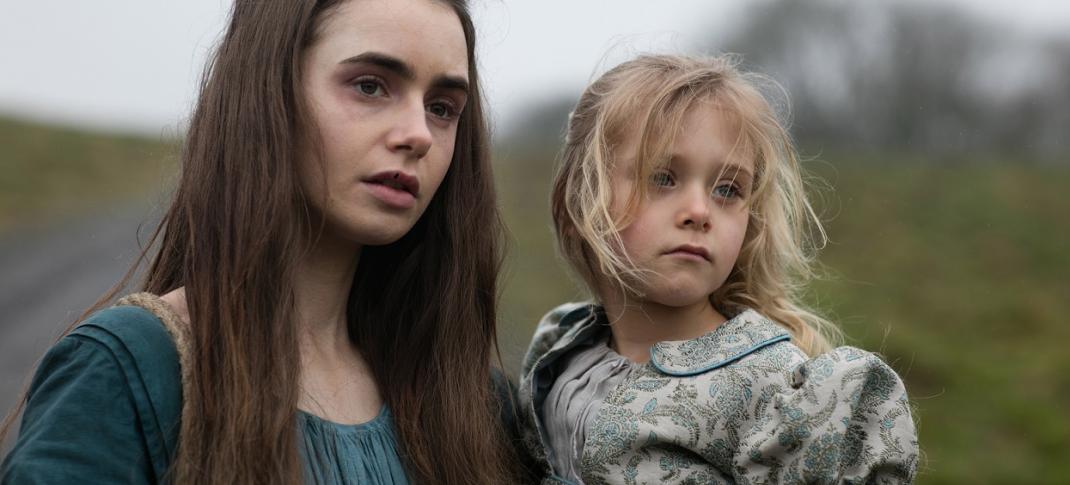'Les Miserables' Episode 2 Recap: I Dreamed A Dream

MASTERPIECE “Les Misérables” Sundays, April 14 - May 19, 2019 at 9pm ET on PBS Episode Two Sunday, April 21, 2019; 9-10pm ET Living respectably as a provincial mayor and factory owner, Valjean hires the single mother Fantine. Trouble follows that reunites him with his old adversary Javert. Picture Shows: Fantine (LILY COLLINS), Cosette (MAILOW DEFOY) For editorial use only. Photographer: Laurence Cendrowicz (C) Lookout Point
Copyright: Lookout Point
Previously on Les Miserables: A new gritty version of Victor Hugo’s classic tale kicked off – by taking its time. The series first episode introduces us to Jean Valjean, prisoner given 19 years hard time for stealing bread, and a starry-eyed young Parisian named Fantine, who wants more from life than the world her lower class status has promised her. Freed from prison, Valjean struggles to find work, as Fantine falls in love with Felix, a posh young man slumming it for the few years before the necessities of his social standing kick in. A kind priest buys Valjean’s salvation by gifting him candlesticks and silverware to start a new life, while Fantine is left abandoned, unmarried and with a young daughter to raise. Need more details? Our Episode 1 recap is here.
The thing about Les Miserables the musical is, despite the fact that it’s full of death and sadness, it’s been restructured as a story about hope. It’s full of songs about love, and hope, and the power of resistance to reshape the world into something better than we found it. Do you hear the people sing? and all that. That’s the version of this story that most of us know. Yes, Fantine dies. As does Enjolras. So do most of the boys at the barricades. But that’s okay, because everyone’s brought back together in the end, to sing a song of triumph. Their deaths meant something, stood for something greater than themselves, mattered. The sweeping tricolore promises freedom, hope and a new world for all, at the end.
The novel, Les Miserables, is not entirely like that, and this episode underscores that fact in spades. Hugo’s novel is a story about poverty. About struggle. About the fact that people were – and generally still are – willing to stand by and say nothing as those around them suffer. It’s about who gets to live and who has to die and the people clawing to survive in the middle.
And a lot of those people are women.

Valjean, on the other hand, has been literally gifted an entirely new life. Of course, it is he who must learn – and implement – the lessons Monseigneur Muriel was so desperate to teach him. And he certainly deserves praise for doing so, particularly because he seems determined to pay it forward whenever he can. Yet, he’s been given a leg up in a way that Fantine has not, and because she has not, the first slip backward for her is the same as the final.
By the time she’s decided to board her daughter out to a seemingly nice family she met by the side of the road, she’s already falling toward her doom, even though she may not know it. The fact that she has a daughter disqualifies her for work – even from well meaning men. She can’t afford to pay the Thenardiers’ extortionate daycare fees. She ends up selling her hair, her teeth and finally her body to eat and take care of her daughter, before finding herself dying among strangers as a charity case at the town hospital.

(At least Valjean ultimately realizes that he – and the world – have done this woman wrong, and he is also pretty much the only person who tries to fix it.)
The fact that this episode drags Fantine’s fate out for an hour, rather than the two songs her life is comprised of in the stage version, makes it all so much harder to watch. Lily Collins gives a tour-de-force performance as the starry-eyed turned broken-hearted ingénue as she realizes that the dreams she held on to were all lies told by people who were never required to live up to them or interested in helping her make them true. The episode ends with Fantine still clinging to life, but even if we had never heard this story before, we’d all already know she’s not long for this world.
Valjean, it appears, may face some sort of comeuppance for the crimes he committed in a life he left behind years ago. But at least he gets the choice about whether he can live with letting another man take the fall for crimes he’s committed. Fantine, for her part, is punished for crimes that aren’t even wholly hers.
What did you think of this latest episode of Les Miserables? Let’s discuss in the comments.




